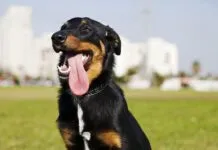An occasional toot here and there is one thing, but if your dog’s nether regions can clear a room, it may be time for some detective work and even a visit to the veterinarian.
Causes of Flatulence
Flatulence—farts or passing gas—is a perfectly normal part of being a dog (or a human!). Your dog’s digestive tract is full of bacteria which aid in digestion by helping to break foods down. As food is broken down, gas is sometimes produced. This gas then escapes the body as a fart.
Your dog can also get gas in his digestive tract by swallowing air. Brachycephalic dogs with short muzzles, such as Pugs, Boston Terriers, and Bulldogs, tend to swallow more air than other dogs because of the structure of their head and neck. This leads to more frequent flatulence. Dogs of any shape can swallow air when panting, wolfing down food, or chugging water.
The food that your dog eats can also increase flatulence. High fat, high fiber, and spicy foods all come with an increased chance of farts. Also, most dogs are lactose intolerant which makes dairy products a risky business. And then of course there are the things that your dog eats even though he shouldn’t such as trash, stolen table scraps, spoiled food, or dead things found in the yard.
Here is a list of possible causes for dog farts:
- Swallowing air when eating or drinking too fast
- Swallowing air while panting after exercise
- Eating cauliflower, broccoli, Brussels sprouts, peas, or beans
- High fat or high fiber diet
- Dairy such as cheese or ice cream
- Spicy foods
- Dietary indiscretion
- Changing to a new food too quickly
- Stress
- Overweight
If you find yourself asking, “Why is my dog farting so much all of a sudden?” these are some easy causes to identify and then avoid in the future. While the toxic gas from a garbage can raid isn’t pleasant, it will pass.
But there are more concerning causes of flatulence in dogs. Health problems in the digestive tract can cause increased or excessively stinky farts. There are even some problems with the heart or lungs can contribute.
These are some health problems that may contribute to dog farts:
- Food intolerance
- Food allergy
- Inflammatory bowel disease (IBD)
- Irritable bowel syndrome (IBS)
- Pancreatitis
- Intestinal parasites
- Inflammation of the colon
- Small intestinal bacterial overgrowth
- Exocrine pancreatic insufficiency (EPI)
- Cancer in the GI tract
- Respiratory disease or cancer in the lungs resulting in increased breathing rate
- Heart disease causing an increased breathing rate
When to Call a Vet
If your dog just farts once in a while or there is a very clear reason why he is extra stinky today (i.e., he stole a bowl of ice cream from your visiting nephew), you don’t have anything to worry about.
A vet visit is in order if your dog has frequent flatulence, or if it suddenly becomes worse in frequency or strength. In many cases bad gas is not an emergency, but it is still helpful to figure out why your dog is so stinky and make a plan to address it.
You should definitely call your vet if your dog has other symptoms of illness including:
- Diarrhea
- Bloody stool
- Vomiting
- Painful abdomen
- Poor appetite
- Weight loss
- Lethargy or depression
- Loud gurgling in the abdomen
- Constant panting even in a cool environment
- Difficulty breathing
If your dog is struggling to breathe or has both vomiting and diarrhea, this is an emergency.
Your veterinarian will use a variety of tests to determine why your dog has bad gas. First, she will ask lots of questions about your dog’s usual diet, any treats he regularly gets, changes to his diet, and if he has gotten into anything recently. Then she will do a physical exam to assess your dog’s overall health including palpating his abdomen. From there she will recommend testing based on what she thinks is the most likely cause of the stinky farts.
Testing may include bloodwork, a fecal exam, rectal exam, diet trial, x-rays, ultrasound, and/or endoscopy of the GI tract with biopsies. If a medical problem is found, appropriate treatment should help to resolve the farts along with any other symptoms.
Why Do My Dog’s Farts Smell So Bad?
Many different factors can impact the intensity of your dog’s farts.
- High fiber foods—these take longer to digest resulting in more gas buildup in the intestines
- Foods containing sulfur that is released during digestion
- Spoiled food
- Bacterial infections
- Inflammation within the GI tract
- Stress, medications, or an illness that causes food to travel too quickly or too slowly through the digestive tract
Adjusting your dog’s diet if needed or treating medical issues can help to decrease the pungency of your dog’s farts.
How to Decrease Dog Farts
If your dog has an underlying medical issue that is contributing to his farts, treating the illness will help to resolve the farts. For example, EPI is treated by adding digestive enzymes to your dog’s meals to help him digest food normally.
Food allergies and intolerances can be difficult to diagnose. True food allergies usually come with skin issues such as chronic ear infections, itchy red skin year-round, and chronic paw infections. Food intolerances are less severe but can still be unpleasant if they cause bloating or abnormal stools. If your veterinarian suspects one of these issues, she will likely recommend trying a novel diet with ingredients that your dog has not had before. If his symptoms go away after 8-12 weeks on the new diet, he probably has a food allergy or intolerance. It may take several rounds of diet trials to identify the ingredient causing the trouble, but protein sources such as beef, chicken, or eggs are the most common offenders for food allergies.
Here are some general tips to decrease stinky farts in your otherwise healthy dog:
- Avoid dairy products
- Feed “farty” vegetables such as broccoli, Brussels sprouts, or beans in moderation
- Feed small, frequent meals rather than one or two big meals
- Use a slow feeder bowl to prevent your dog from gulping down his food
- Keep your dog active—exercise and lean body condition improve digestion
- Consider switching to a food that is easily digestible and low in fat and fiber
- Add dog-specific probiotics to your dog’s meals
- Choose low-fiber dog treats
- Skip the table scraps
- Secure garbage bins so your dog can’t get into them
- Consider supplements that include Yucca shidigera or zinc acetate
- Ask your veterinarian about the medication simethicone or starting your dog on an antacid
We hope these tips help your family to breathe easy!








